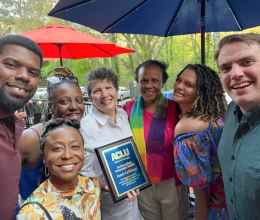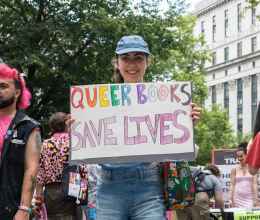
Supreme Court Ruling Protects LGBTQ Workers From Job Discrimination
By Allison Stevens and Jill Nolin | Georgia Recorder | June 15, 2020
Other Pages
WASHINGTON — In a landmark victory for LGBTQ rights, the U.S. Supreme Court held Monday that employers can’t legally fire people because of their gender identity or sexual orientation.
In a 6-3 opinion, the court ruled that employers who fire individuals “merely for being gay or transgender” violate Title VII of the 1964 Civil Rights Act, which bans discrimination on the basis of sex and other characteristics — but not specifically gender identity or sexual orientation.
Conservative Justice Neil Gorsuch, President Donald Trump’s first appointee to the high court, and Chief Justice John Roberts sided with the court’s four liberal justices in the case. Justices Samuel Alito, Clarence Thomas and Brett Kavanaugh filed dissenting opinions.
“An employer who fires an individual for being homosexual or transgender fires that person for traits or actions it would not have questioned in members of a different sex,” wrote Gorsuch, who authored the majority opinion. “Sex plays a necessary and undisguisable role in the decision, exactly what Title VII forbids.”
The ruling will have a profound effect on millions of LGBTQ people and their families. Nearly 5% of U.S. adults — more than 11 million people — identify as LGBTQ, according to Reuters, and large percentages report workplace discrimination. More than 40% of lesbian, bisexual and gay people — and 90% of transgender people — have faced employment discrimination based on their sexual orientation, according to court documents.
Gerald Bostock of Georgia, who was working as a court-appointed special advocate for abused and neglected children in Clayton County, lost his job after joining a gay recreational softball league seven years ago.
“I lost a dream job that I had, I lost my income and I lost my medical insurance at a time that I was recovering from prostate cancer,” 56-year-old Bostock, who now lives in Atlanta, said during a livestreamed press conference held Monday after the ruling was announced.
“But I learned early on with this that it’s always been about so much more. It’s such a bigger issue than just my own personal experiences,” he said.
At a time of civil unrest nationally, Bostock said he hopes people see the ruling as a “step in the right direction for our country.”
“There is absolutely no room in this world for discrimination or racism,” Bostock said, “And I hope this celebration – that we’re all sharing in today – that it sheds a little bit of light in the dark days that we’ve had across this country in the past few weeks.”
Alphonso David, president of the Human Rights Campaign, hailed the “historic” decision Monday. “No one should be denied a job or fired simply because of who they are or whom they love,” he said in a statement.
But he said more work remains. The high court legalized gay marriage in 2015, but about half of states – including Georgia – lack statutes protecting LGBTQ people from workplace discrimination.
“It’s important to recognize that today’s decision, formally speaking, only applies to federal anti-discrimination law,” said Sean J. Young, legal director with the ACLU of Georgia.
“Federal anti-discrimination law does not necessarily apply to every single employer, such as small businesses that have 15 or fewer employees. Only state and/or local law can prohibit discrimination for those businesses.”
On the federal level, House Speaker Nancy Pelosi (D-Calif.) pointed to legislation passed last year by the U.S. House that would amend existing civil rights law to explicitly cover sexual orientation and gender identity and make other changes.
Senate Majority Leader Mitch McConnell (R-Ky.) “must end his partisan obstruction and allow the Senate to vote on this critical legislation,” she said in a statement.
Jeff Graham, executive director of Georgia Equality, called Monday’s ruling “decisive” but said more protections are needed to ensure a level playing field.
“There is a long way to go towards making sure that members of the LGBT community are protected against discrimination in all of its forms – not just employment but in housing, in public accommodations and access to credit and access to education,” Graham said.
Justices heard cases last fall involving plaintiffs who argued that they were wrongfully fired because of their gender orientation and sexual identity.
Bostock is the only surviving plaintiff in the case. Aimee Stephens — a transgender woman from Michigan — was fired after she informed her boss she planned to transition from male to female. She died in May. Donald Zarda, a skydiving instructor in New York, was fired after informing a customer of his sexual orientation. Zarda died in 2014.
State Sen. Nikema Williams, who chairs the Democratic Party of Georgia, called the ruling “a long sought victory for LGBTQ Americans” and drew a parallel to the ongoing protests against police brutality.
“As we celebrate LGBTQ+ Pride this month, and observe millions marching in the streets calling for true justice for all, we must remember that today’s victory is the result of hard work by the activists and protesters, many of whom were LGBTQ people of color, who marched before us,” Williams said in a statement.
“The work ahead of us is still vast — but today’s decision affirms that every person deserves equal rights and equal treatment under the law, and we will fight until we make that true,” she said.
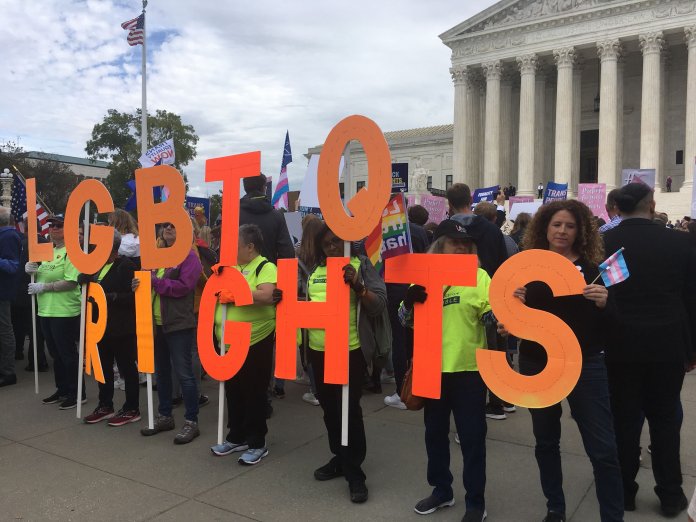
Gerald Bostock worked in Clayton County's child welfare office several years ago when he lost his job after he joined a recreational gay softball league. In a landmark victory for LGBTQ rights in a case with Bostock as a plaintiff, the U.S. Supreme Court held Monday that employers can’t legally fire people because of their gender identity or sexual orientation. Allison Stevens/Georgia Recorder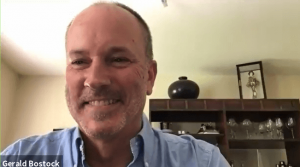
Gerald Bostock was working for Clayton County when he was fired for after joining a gay recreational softball league. He is the only surviving plaintiff in a major case decided Monday. Screenshot from Georgia Equality press conference
Related content

SB 180 - "Religious Freedom" Restoration Act
March 13, 2024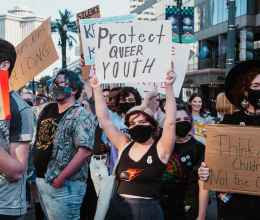
Legislative Recap: Five Bills To Watch Through the End of Session
March 8, 2024HB 936
February 22, 2024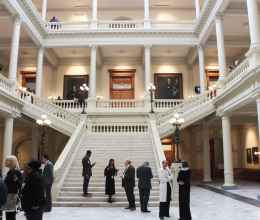
Legislative recap: Committee Passes Anti-LGBTQ+ Bill Without Taking...
February 16, 2024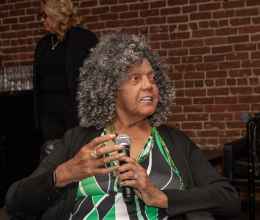
Stonewall activist Miss Major, ACLU of Georgia and Georgia Equality...
October 27, 2023Press Statement: Federal Judge Staying Preliminary Injunction...
September 6, 2023Federal Judge Issues Injunction that Restores Health Care for...
August 21, 2023